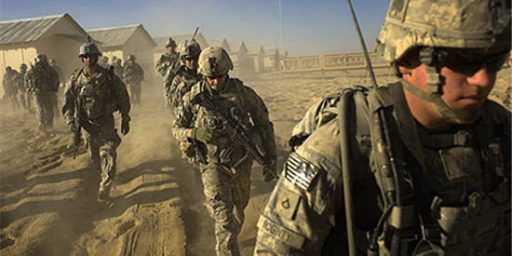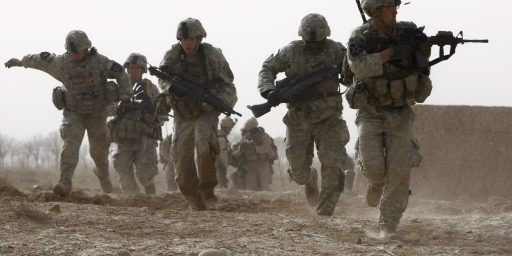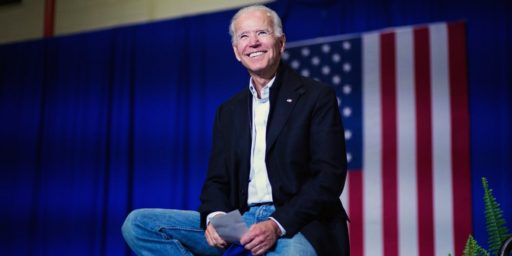Democrats Splitting Over Afghanistan?
While President Obama is pushing the Afghanistan surge, large numbers of elected Democrats are demanding we get out.
Two stories on memeorandum this morning give the impression that President Obama’s position on the war in Afghanistan could fracture his party.
First, Pennsylvania Governor Ed Rendell, a former DNC chairman, told the Morning Joe gang that President Obama could face a primary challenge over the war. And an ABC headline screams “House Democrats Buck President Obama on Afghanistan.”
But there’s less to both stories than the headlines make it seem. (Shocking, I know.)
First, Rendell was answering a hypothetical put to him by Pat Buchanan.
PAT BUCHANAN: [Anti-Vietnam sentiment] drew an anti-war candidate, Eugene McCarthy, first into the New Hampshire primary, and after he did fairly well with 42%, it drew Robert Kennedy in against their own president, tore the Democratic Party apart, and led, of course, to a Republican era. If the president is still hanging in to Afghanistan in 2011, 2012, do you see an anti-war candidate coming out of the Democratic Party?
ED RENDELL: It’s possible, Pat. It really depends on how far it deteriorates. But on the other hand, if troop withdrawal begins in 2011, if there’s some signs that we’re trying to get out of there, and I heard, I think you were talking about, if there are only 3,000 American troops, we still have a presence. But if we start to begin to reduce our presence, I think that’s probably enough to keep an anti-war candidate out of the race.”
So, in a hypothetical universe where the situation deteriorates and Obama doesn’t adjust his policies accordingly, he might face a challenger. But, since Obama is, if anything, willing to tack his policies in accordance with electoral realities, that seems highly unlikely. Mark my word: If things aren’t markedly better in Afghanistan a year from now — and I don’t think they will be — we’ll start bugging out.
The ABC story is even more comical. The headline would make you think that the bill failed. Instead, it sailed through 308-114.
The House on Tuesday sent President Barack Obama a major war-funding increase of $33 billion to pay for his troop surge in Afghanistan, unmoved by the leaking of classified documents that portray a military effort struggling between 2004 and 2009 against a strengthening insurgency.
The House voted, 308-114, to approve the spending boost for the additional 30,000 U.S. troops in Afghanistan. Other non-war provisions brought the total bill to nearly $59 billion.
From Obama on down, the disclosure of the documents was condemned by administration officials and military leaders on Tuesday, but the material failed to stir new anti-war sentiment. The bad news for the White House: A pervasive weariness with the war was still there – and possibly growing.
Republicans in Congress still were strongly behind the boost in war spending, but there was unusually strong opposition from members of Obama’s own Democratic Party. All but 12 of the “no” votes in the House came from Democrats.
So, a Democratic-controlled House not only didn’t block funding for the war, but it doubled down on it. Indeed, the title tag for the post — which generates the title that search engines and browsers see — uses the right headline: “Afghanistan War Funding Bill Clears Congress With Major Spending Increase.”
House Speaker Nancy Pelosi and other senior Democrats — including Vice President Joe Biden — are hostile to the president’s policy. That’s doubtless a problem. But it’s not going to matter in November and will affect the 2012 elections only if Obama continues pressing an unpopular agenda that he himself seems to only tenuously support. I wouldn’t count on that.







“Mark my word: If things aren’t markedly better in Afghanistan a year from now — and I don’t think they will be — we’ll start bugging out.”
Couldn’t agree more Jim. And mark my words, the president will be very happy about it. He clearly has next to zero enthusiasm for this but the political conditions are not right to pull the plug. It’s not so much the right’s kamikazi attachment to this fiasco (although that’s a factor in shaping public opinion) as the fact that there is still a majority for perseverance amongst “official” Washington. There’s a clear majority in the Pentagon (when did soldiers last admit they couldn’t win a war) and Gates is very influential. It’s probably more evenly split at State but there’s probably still a narrow majority for hanging in there. And there are major imponderables about the consequence of withdrawal. Against this background it’s very difficult for a president (or any civilian leader) to buck military/diplomatic consensus despite popular myths about presidential absolutism. A classic similar case was Lloyd George the British PM in WW 1 who couldn’t stop the military mounting another massive slaughter in 1917 despite three years of carnage. Thus the president has look for that famous political curve to develop and then ride it. This was FDR’s great skill, he never got to far out in front of official and public opinion. The action of the Democrats plus the mounting evidence from polls show this curve in formation, by the spring of next year when things will be no better I expect official Washington to have shifted and as you so eloquently put it “we’ll start bugging out.”
Obama’s surge ends next year, well in advance of the 2012 election.